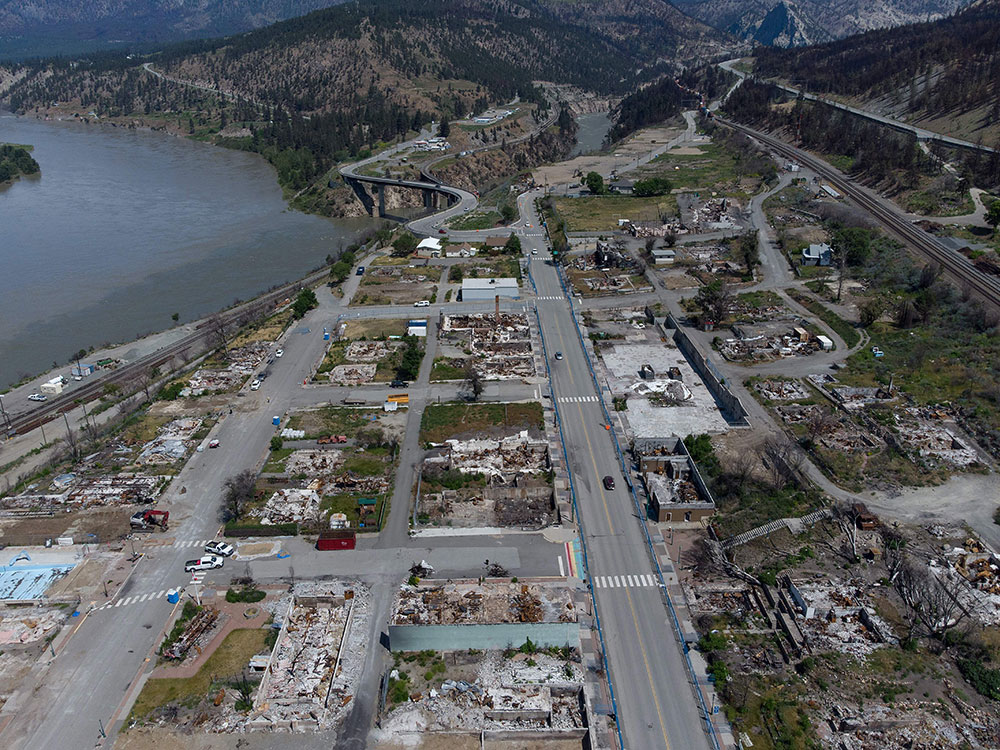A proposed class-action lawsuit under review in B.C. Supreme Court this week could win compensation for Lytton area residents and shed light on the cause of the devastating 2021 wildfire.
The fire destroyed 90 per cent of the small community and two people were killed.
A hearing is underway in Vancouver to determine whether the court will certify the class-action lawsuit, which was filed in October 2021 by law firm Slater Vecchio LLP on behalf of Christopher O’Connor, Jordan Spinks and anyone impacted by the Lytton Creek wildfire.
If the case is approved, the plaintiffs could ask the BC Wildfire Service, responsible for determining the fire’s cause, to release information about what led to the blaze, something it has failed to do in the 19 months since the fire.
The proposed lawsuit seeks damages from Canadian Pacific and Canadian National railways, the government of Canada and a U.S.-based rail safety company doing business as eRailSafe Canada.
Despite widespread speculation that a train started the fire, an official cause has never been released.
In October 2021, a Transportation Safety Board of Canada investigation said it found “no evidence” that the fire was caused by the railway.
Railway companies have also denied responsibility.
But Lytton residents have criticized the TSB investigation, saying only railway employees — and not locals who witnessed the start of the fire — were interviewed.
Lead plaintiffs O’Connor and Spinks, both Lytton-area residents, allege that negligence on the part of Canada’s leading railway companies and the federal government created conditions leading up to the Lytton Creek wildfire that were “foreseeable and preventable,” according to an application filed in December asking the courts to certify the class-action.
“The plaintiffs allege that the defendants CN Rail and CP Rail who owned, occupied, and/or had care and control over the land where the Lytton Creek wildfire broke out knew or should have known that the area was a severe risk for wildfires in the summer,” the application says.
“They had a duty to engage in fire prevention measures, and they failed to take adequate steps, or any steps, to prevent the Lytton Creek wildfire.” Several unnamed defendants in the lawsuit are alleged to be responsible for things like manufacturing trains and railway tracks, fire prevention and monitoring conditions, the application says.
None of the allegations have been tested in court.
Spinks is the former chief of the Lytton First Nation and O’Conner the former mayor of Lytton.
The Lytton Creek fire was ignited south of Lytton, a village of about 250 residents, on June 30, 2021, as the province was in the throes of a deadly heat dome.
In early June 2021, the BC Wildfire Service issued a monthly bulletin noting that many regions in the province had received low rainfall and that 284 wildfires had been detected since April, the recent application says. The service anticipated “the frequency and size of fires to increase as the hot dry spell continued,” it adds.
The bulletin was followed by Environment Canada heat warnings, with temperatures forecast to reach 40 C or higher in the Lytton area. The village would break heat records on three consecutive days in late June, hitting 49.6 C — the highest temperature ever recorded in Canada — on June 29.
Fire broke out the following afternoon “on or near” the railway tracks near the southern end of Lytton at about the time that a train consisting of 157 coal cars passed through Lytton, according to the application. The train was owned by CP Rail and being operated by CN Rail.
As it passed, a forward-looking camera on the train showed “no indication of any fire” where the blaze is believed to have ignited, the court filing says. But “shortly after” the train travelled through the area, the first calls about a wildfire were made to emergency services, according to the application.
Eyewitnesses, including Spinks, “observed smoke and flames at or near the CNR Fraser Bridge at the time the fire broke out,” it says.
“The Lytton Creek wildfire rapidly moved northwards towards Lytton, resulting in an evacuation order and the near complete destruction of the village,” the filing says. The fire also ravaged nearby First Nations reserves, destroying homes, businesses, a church, Nlaka'pamux Health Services, a daycare and Lytton First Nation band office.
“The Lytton Creek wildfire went on to burn over 85,020 hectares of land, resulting in two deaths and widespread destruction,” the application says. It would take two months to bring the wildfire under control.
The lawsuit alleges that CN Rail and CP Rail, which operate in the Lytton area and share the tracks, “failed to minimize fire risk in fireprone areas of British Columbia, including Lytton” prior to the fire by failing to ensure the area was cleared of organic material and other fuel sources and failing to ensure that train operations were unlikely to spark a fire.
The companies also failed to maintain or deploy firefighting or prevention equipment, failed to implement or adhere to policy designed to prevent wildfires, and failed to ensure that staff were trained to minimize fire risk, the application says.
Last summer, one year after the blaze, The Tyee reached out to the BC Wildfire Service and RCMP for an update on their joint investigation.
At the time, the wildfire service said it was “working actively” with the force on the investigation, with it focusing on determining the fire’s origin and cause. It suggested a report could be made available by fall.
When asked again in December, the wildfire service said it had no updates on the investigation and could not provide a timeline for releasing the report. It said its website would be updated when information becomes available.
On Tuesday, the cause of the Lytton Creek fire remained “undetermined.”
The Tyee also requested an update from the RCMP this week. Sgt. Kris Clark, senior media relations officer with the BC RCMP, said in an email that “The investigation remains active and ongoing but there are no updates we can provide at this time.”
Although B.C.'s wildfire investigation reports aren’t routinely made public, The Tyee reviewed more than a dozen reports released through freedom of information over the past decade.
They show that, in most cases, fieldwork to determine the cause of a fire wrapped up within days of the fire’s start date. The reports, which were often hundreds of pages, were all released within a year, with the average length of time to make the findings public about six months.
If the O’Connor-Spinks lawsuit goes ahead, the plaintiffs are asking for speedy disclosure of documents by the defendants.
But Sam Jaworski, a trial lawyer with Slater Vecchio LLP, confirmed that certification does not automatically compel the wildfire service to provide the records.
The documents sought include the fire investigators’ reports, along with supporting data like photos, videos, witness interviews and “the identification of possible fire cause categories.”
Also requested are railway companies’ timetables, safety management systems, risk evaluations, maintenance records, fire plan, training records and plans related to fire hazard and extreme weather risk, according to the plaintiffs’ application.
They seek relief for “common law damages in negligence and nuisance, related health-care costs recovery, punitive damages, and declaratory and injunctive relief.”
The hearing is expected to continue through Friday. It’s not known when the court will issue a decision. ![]()
Read more: Rights + Justice, BC Politics, Environment
















Tyee Commenting Guidelines
Comments that violate guidelines risk being deleted, and violations may result in a temporary or permanent user ban. Maintain the spirit of good conversation to stay in the discussion and be patient with moderators. Comments are reviewed regularly but not in real time.
Do:
Do not: